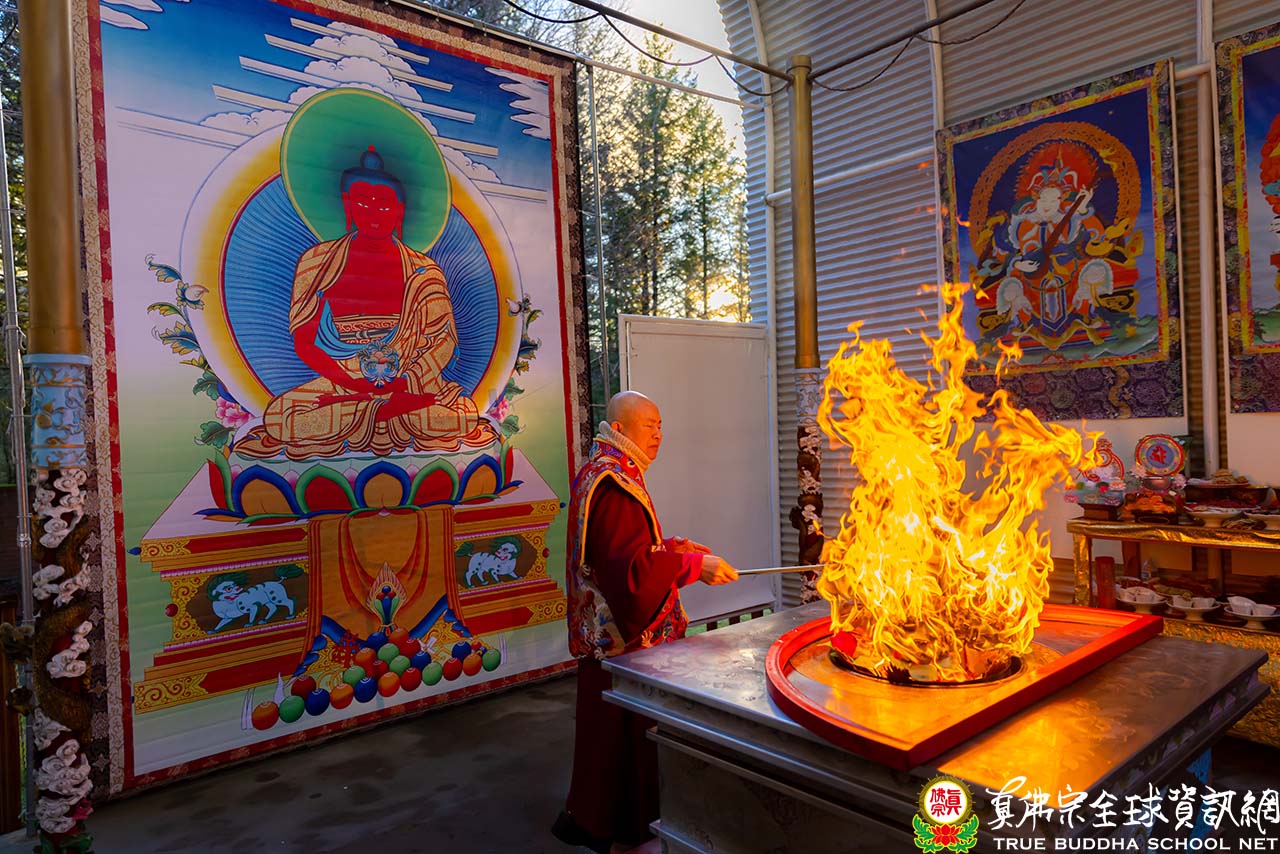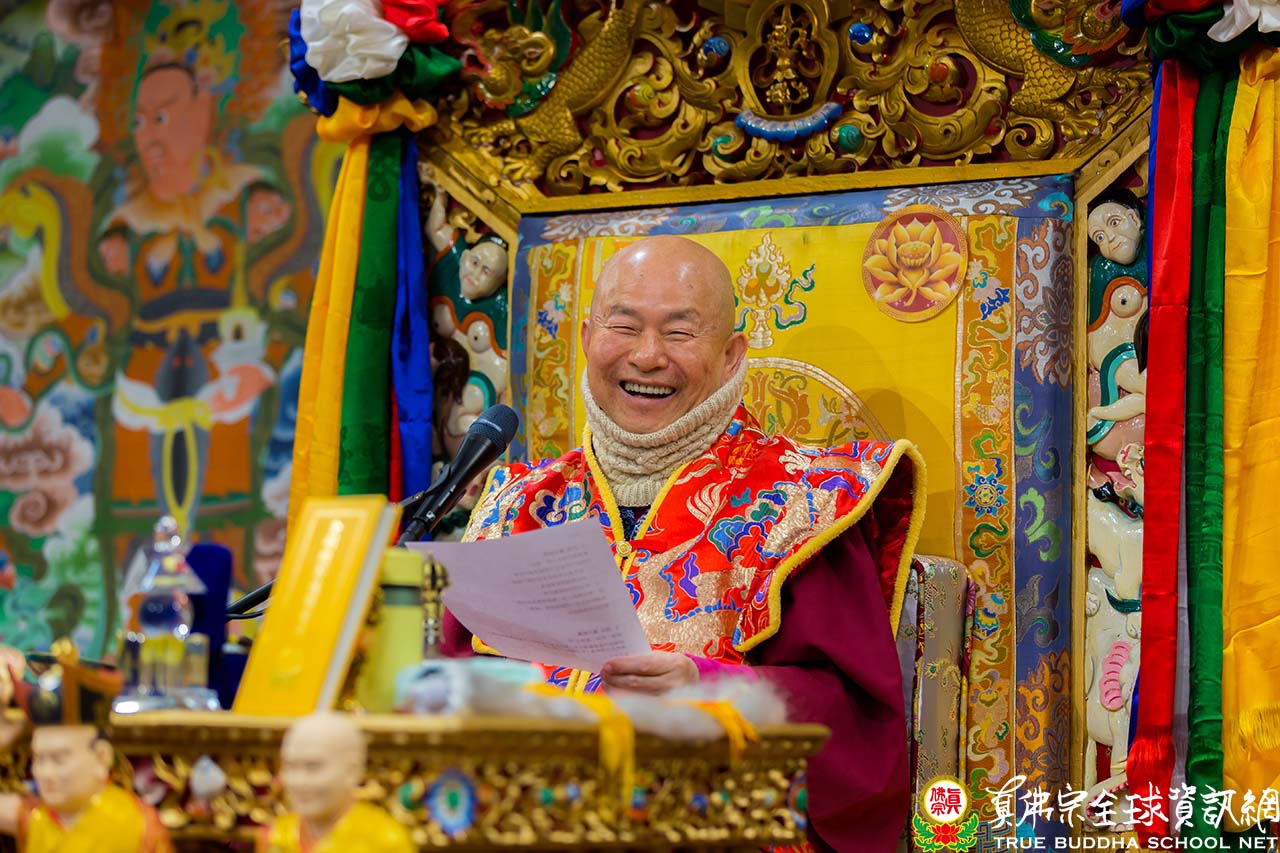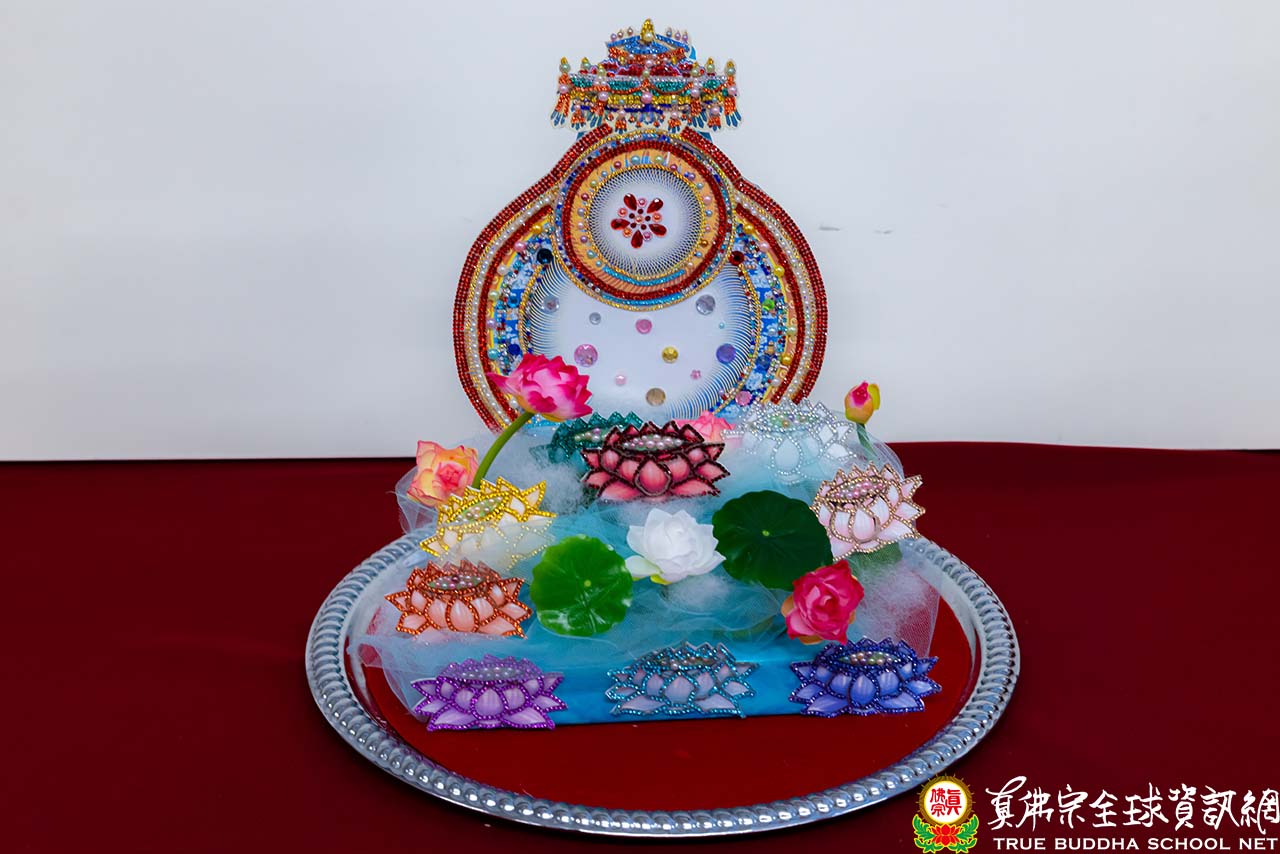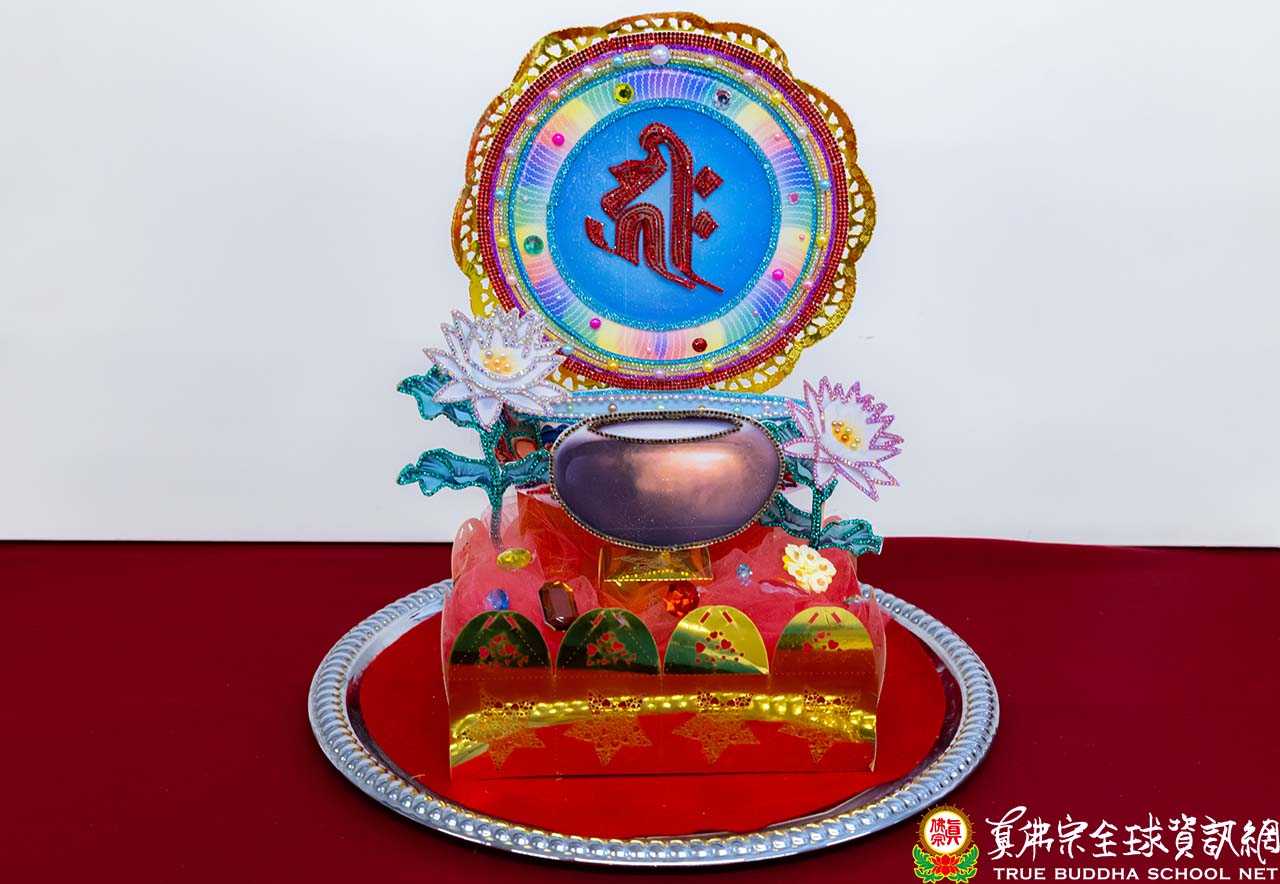
Vajracchedika Prajnaparamita Sutra
Vajra Sutra (Diamond Sutra)
Detailed Exposition by Living Buddha Lian-Sheng, Grandmaster Sheng-Yen Lu
Translated into English by True Buddha School Vajra Sutra Translation Team
Fourteen—Extinction Upon Abandoning Phenomena
Subhuti understood its profundity upon hearing this sutra and was moved to tears. He said to the Buddha, “World-honored One, it is rare indeed for the Buddha to speak on such a profound sutra. I have never heard of such a sutra ever since I attained my wisdom eyes.
“World-honored One, if someone generates pure faith upon hearing this sutra, they will give rise to real phenomena. This person will obtain the rarest of merits.
“World-honored One, the real phenomena are non-phenomena. Therefore, the Tathagata named it real phenomena.
“World-honored One, it is easy for me to believe, comprehend, accept, and uphold this sutra immediately upon hearing it. However, in the ensuing five hundred years, it would be most rare for sentient beings to hear, believe, understand, accept, and uphold the sutra. Why? Because [it is extremely rare for] a person not to have any view of self, others, sentient beings, and lifespan. The phenomena of self is non-phenomena, and so are the phenomena of others, the phenomena of sentient beings, and the phenomena of lifespan; they are all non-phenomena. Why? [Only] those who abandon all phenomena are called buddhas.”
The Buddha told Subhuti, “Just so, just so, Subhuti! If there is a person who is not shocked, frightened nor fearful upon hearing this sutra, it is extremely rare indeed! Why? Subhuti, the Tathagata said that the first and foremost paramita is not the first and foremost paramita; it is [merely] named the first and foremost paramita.
Subhuti, the Tathagata said that endurance paramita is not endurance paramita; it is [merely] named endurance paramita. Why? Subhuti, in the past, when King Kalinga dismembered my body, I was [in the state of] non-phenomena of self, others, sentient beings, and lifespan. Why? Because if I had the notion of self, others, sentient beings, and lifespan during the dismembering of my limbs, I would have felt hatred.
“Subhuti! Also, think of the sages who have practiced endurance for the past five hundred lifetimes, wherein each lifetime, they have no phenomena of self, others, sentient beings, and lifespan.
“Therefore, Subhuti, a bodhisattva should abandon all phenomena, generate the mind of anuttara samyaksambodhi, and give rise to the mind which does not dwell on sight, sound, smell, taste, touch, or anything at all. Even if the mind dwells on something, it is regarded as non-dwelling.
“Therefore, the Buddha said that a bodhisattva should not dwell on form when he performs the acts of giving. Subhuti! A bodhisattva should perform the acts of giving to benefit all sentient beings. The Tathagata said, ‘All phenomena are non-phenomena. Also, all sentient beings are not sentient beings.’ Subhuti, the Tathagata speaks truthfully, realistically, accordingly, credibly, and absolutely.
“Subhuti, all the dharma [anything] obtained by the Tathagata are neither real nor false. Subhuti, if a bodhisattva dwells on anything while performing acts of giving, it is as if he is in the dark; he will not see anything. If a bodhisattva does not dwell on anything when performing acts of giving, he is not blinded and will be able to see all sorts of forms as if the sun is shining.
“Subhuti! In future lives, should there be good men and good women who can accept and uphold, read or recite this sutra, they will be known and seen by the Tathagata through his wisdom, and they will attain vast and boundless merits.”

Let’s talk about the Vajra Sutra’s Chapter Fourteen—Extinction Upon Abandoning Phenomena. The Buddha told Subhuti, “Just so, just so, Subhuti! If there is a person who is not shocked, frightened nor fearful, upon hearing this sutra, it is extremely rare indeed!”
Let me tell you! It is of crucial importance for someone not to be shocked, frightened, nor fearful upon reading the Vajra Sutra or hearing Grandmaster’s exposition on it. These words—not shocked, not frightened, not fearful—are very important. Most people are taken aback and astounded when they hear it. In fact, they would be utterly shocked! Why is that? It is because the Vajra Sutra speaks of the non-phenomena of self, others, sentient beings, and lifespan. Only Sakyamuni Buddha made this statement. No other religions ever mentioned this.
Sakyamuni Buddha was born in India [where Hinduism is most prominent]. Hinduism speaks of the Trinity of Visnu, Brahma and Siva. Visnu is from Visnuloka in the Akanista Heaven, the highest heaven of the realm of form. Brahma, the god of creation resides in the Mahabrahma Heaven in the first dhyana heaven of the realm of form. And in the highest heaven of the realm of desire is the Mahesvara Heaven where Siva resides. These are the three major gods in Hinduism: Visnu of Visnuloka, Brahma of the Mahabrahma Heaven, and Siva of the Mahesvara Heaven. They appear in specific forms, with their favorite companions. Visnu’s mount is Garuda, the great golden-winged mythical bird. Brahma is often accompanied by a white swan, while Siva is by a white bull. They all have appearances.
However, the Buddha explains that these appearances do not really exist! I do not exist, you do not exist, they do not exist. When sentient beings learn about this notion of the non-existence of everything, they would become bewildered, and even frightened.
If nothing exists, then does heaven exist? No, even heaven does not exist. Does hell exist? No, hell likewise does not exist. Isn’t that strange? Why would Sakyamuni Buddha state as such? He obviously said that hells exist, and the three lower realms (including the hungry ghost and animal realms) exist, didn’t he? The Buddha stated nothing exists because in his eyes, nothing exists. Such is the case when you have reached the highest level of attainment as stated in the Vajra Sutra. This is the king and the highest of all sutras, nothing else surpasses it! It is indeed “most rare.” Anyone expounding the sutra must completely comprehend this. But most people would be shocked by it.
There is a zen koan [that illustrates this]. A disciple asked his master, “Is there such thing as hell?” The master said, yes. Then another disciple asked the same question but this time the master replied no. Listening at the side, the master’s attendant was baffled as to why the master said yes to the first disciple but no to the next. He asked, “Master, you told the first person that hell exists but then told the second person that hell does not exist. I don’t understand. So does hell exist or not?” The master replied, “You asked the right question! The truth is that hell both exists and does not!” How can this be possible? The answer is simple. The first person has [bad] karma [making him fall into hell]. Consequently for him, hell exists. But the second person has been purified through his spiritual cultivation, therefore the master told him hell does not exist. Do you understand now? [applause] Since the second person does not have [the karmic conditions] to go to hell, hell therefore does not exist for him.
As rare as it is, once you reach the [ultimate attainment as described in the] Vajra Sutra, you will find that even the heavens do not exist. All three heavenly realms of kamaloka, rupaloka, and arupaloka are non-existent. Once you have this realization from the Vajra Sutra, you will have surpassed all the heavenly realms! To you, there is no such thing as heaven or hell. Sakyamuni Buddha was the only one who was able to make such a statement. Isn’t this shocking? Yes, of course!
And frightening, too! When you hear this, don’t you find it frightening? Of course it is. Why? Because [it sounds as if] there is no point in living when nothing exists. “I” do not exist; Sheng-Yen Lu, the True Buddha School, the books I have written, my everything… they do not exist. My children and grandchildren, none of them exists! Your money, properties, cars… all of them are non-existent. Everything you own is gone. Is this not frightening to you? Of course, it is immensely terrifying to learn that you have nothing at all!
In meditation, some people [feel like they are] falling into a black hole, whereas others [feel like they] float higher and higher in the sky. They become really scared as there is absolutely nothing around them. Nothing below, nothing above, and nothing around them. They are all by themselves, alone in the sky! Wouldn’t this be scary? Indeed, it is. This is the kind of fright the sutra was talking about. [Jokingly saying,] this sutra is indeed the most frightening. [laughter]
Moving on… When you are not fearful, you will not reject what the Buddha revealed. Grandmaster has explained this: the true reality is that nothing exists! This is referred to as the real phenomena. Real phenomena is the non-phenomena. Non-phenomena is the real phenomena. [True reality has no phenomena in it. When all phenomena cease to exist, that is regarded as the true reality.]
Only when you have karma, will you have phenomena. If you have no karma, then you have no phenomena whatsoever. There is no need for you to reincarnate nor to enter nirvana. You will become an everlasting, eternal buddha. The same applies when you reach bodhisattvahood, pratyekabuddhahood, and sravakahood. Together with buddhahood, the four sagely realms are all like this.
A lot of things in life last only for a moment. That is why I said that high positions are merely momentary, being the wealthiest is momentary, being the most beautiful is momentary, everything is momentary. In fact, [nothing lasts, thus] nothing exists, as described in the Vajra Sutra. That is why I emphasized that when you can truly comprehend the most important meaning of the sutra, you would be a person who is not shocked, frightened nor fearful, upon hearing this sutra. And it is extremely rare indeed! It is extremely rare as most people are scared to lose [everything].
Look at the first emperor of China, Qin Shi Huang, who wanted to be emperor forever. He searched for an immortality elixir everywhere so he could live forever and be emperor eternally. However, [being an emperor] is merely momentary. Han Wu Di also sought an immortality elixir. At the top of Mount Tai, he implored Golden Mother to grant him an immortality elixir so he would remain emperor and live forever. Back then, the emperor had the highest authority, and both Qin Shi Huang and Han Wu Di were legendary emperors. However, it was all momentary. There is no such thing as immortality, certainly not [on earth]!
Today, the highest authority, military power, wealth… they are all momentary. Same with any ownership, any properties, they are all transient. Even your body only lasts temporarily. How can you maintain the body to live forever? It is not possible in this world. I often repeat the saying that I am born alive, but can’t possibly plan on leaving alive. Isn’t this a fact? Is there a person who can leave this world alive? We all leave this world dead! Everything is momentary, the body is temporary too!
Look beyond [all phenomena]! Sakyamuni Buddha teaches us to see through all these. Do you talk about romance, like the song “loving you for ten thousand years?” How silly! [laughs] Those songs are a scam. [laughs] There may be a thing called a seven-year itch, but no such thing as ten thousand years of love.
If you have penetrated this true reality and are always mindful of it, then you will be able to gradually reduce your desires. [Keep in mind that] nothing matters, everything is fine, it is okay and no big deal. If you can reach this state, you will just let things be and go with the flow.
…Why? Subhuti, the Tathagata said that the first and foremost paramita is not the first and foremost paramita, it is [merely] named the first and foremost paramita.
Let us talk about this part. This is very simple. The first and foremost [paramita] to reach the shore of liberation is not the first and foremost [paramita] to reach the shore of liberation. Because it is not, therefore it is. By now, you can understand this statement, right? Arriving at the shore of liberation is identical to not arriving there because there is no shore at all. Or we can say that this shore is also the other shore. Once you understand this, you will understand that the first and foremost paramita is not the first and foremost paramita, it is merely called the first and foremost paramita. That is what it means. Do you now understand?
Om mani padme hum.


Next discourse on the Vajra Sutra: Discourse 44, 25 December 2021 - Chapter Fourteen—Extinction Upon Abandoning Phenomena (continued)
Previous discourse on the Vajra Sutra: Discourse 42, 18 December 2021 - Chapter Fourteen—Extinction Upon Abandoning Phenomena (continued)
Index of links to all discourse on the Vajra Sutra: https://en.tbsn.org/guidem/detail/2265/
Back to the main index page of all dharma discourse: https://en.tbsn.org/guidem/index
Full webcast of 2021.12.19 Amitabha Homa Ceremony (Rainbow Temple, North Bend, USA) and dharma discourse with English interpretation: https://youtu.be/cbQwyZY6i9A



